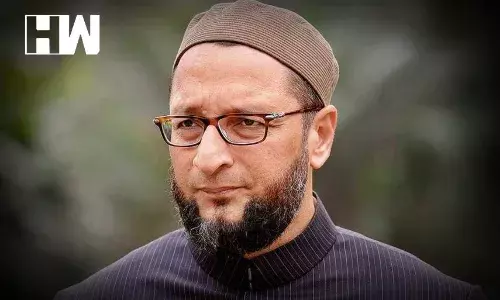Asaduddin Owaisi on Friday, congratulated the Indian Navy on their new indigenous aircraft carrier and further asked for a special parliamentary session to discuss the China border situation.
New Delhi: All India Majlis-E-Ittehadul Muslimeen (AIMIM) chief Asaduddin Owaisi on Friday, congratulated the Indian Navy on their new indigenous aircraft carrier and further asked for a special parliamentary session to discuss the China border situation.
Opposition party’s chief Owaisi took to Twitter to laud the Indian Navy for advancement in their fleet and at the same time, he asked the government led by Prime Minister Narendra Modi to call a special parliamentary session where they can discuss India-China border situations and Centre’s policies. His tweet read, “Heartiest congratulations to the Indian Navy on INS Vikrant. Let us hope that this gives our government and @PMOIndia the courage to call a Special Parliamentary session to discuss the China border situation and our policy.”
Meanwhile, Congress’s senior leader Jairam Ramesh also Tweeted in reference to the INS Vikrant and said, “India’s 1st indigenous aircraft carrier INS Vikrant commissioned today is a collective effort of all govts since 1999. Will PM acknowledge? Let’s also recall the original INS Vikrant that served us well in the 1971 war. Much Krishna Menon played a key role in getting it from the UK.”
Earlier on Friday, Prime Minister Narendra Modi commissioned the first indigenously designed and built aircraft carrier INS Vikrant at Cochin Shipyard Limited here in Kochi — a significant step of the Central government towards self-reliance in the defence sector.
While commissioning INS Vikrant, the Prime Minister termed the event a “tribute” to India’s rising spirits on the world horizon.
Also Read: BJP People Roam Around With Moneybags To Poach MLAs Says Chhattisgarh CM Bhupesh Baghel
Designed by the Indian Navy’s in-house Warship Design Bureau (WDB) and built by Cochin Shipyard Limited, a Public Sector Shipyard under the Ministry of Ports, Shipping and Waterways, Vikrant has been built with state-of-the-art automation features and is the largest ship ever built in the maritime history of India.
The indigenous aircraft carrier is named after her illustrious predecessor, India’s first aircraft carrier which had played a vital role in the 1971 war. It has a large number of indigenous equipment and machinery, involving major industrial houses in the country as well as over 100 Micro Small and Medium Enterprises (MSMEs).
With the commissioning of INS Vikrant, India now has two operational aircraft carriers bolstering the maritime security of the nation. INS Vikrant, built at a cost of around Rs 20,000 crore, successfully completed its fourth and final phase of the sea trials last month. With the construction of ‘Vikrant’, India has joined a select group of nations having the niche capability to indigenously design and build an aircraft carrier.
The ship has over 2,300 compartments, designed for a crew of around 1,700 people, including specialised cabins to accommodate women officers.
Vikrant has a top speed of around 28 knots and a cruising speed of 18 knots with an endurance of about 7,500 nautical miles. The aircraft carrier is 262 metres long, 62 metres wide and has a height of 59 metres. Its keel was laid in 2009.
The commissioning of India’s first indigenous aircraft carrier is a momentous occasion during the ‘Amritkaal of India’s 75 years of independence and signifies the country’s confidence and prowess.
This indigenous aircraft carrier is proof of the country’s technical acumen and engineering skills. This demonstration of India’s self-sufficiency to produce an aircraft carrier warship will reinforce the country’s defence indigenization programs and ‘Make in India’ campaign.
With the commissioning of INS Vikrant, India has forayed into the elite club of nations that can build their own aircraft carriers.
(Except for the headline, this story has not been edited by HW News staff and is published from a syndicated feed.)
As an independent media platform, we do not take advertisements from governments and corporate houses. It is you, our readers, who have supported us on our journey to do honest and unbiased journalism. Please contribute, so that we can continue to do the same in future.

